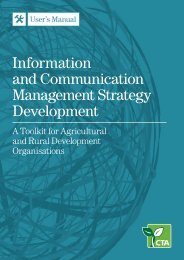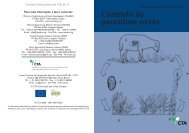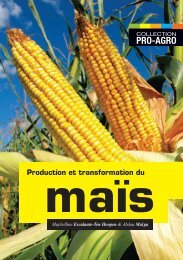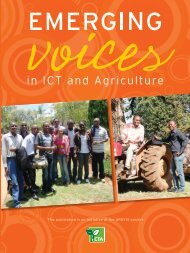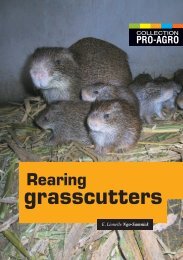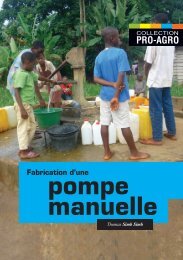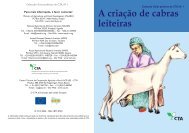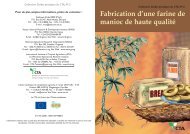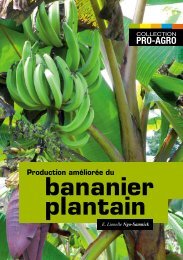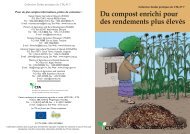Policy framework for Pastoralism in Africa
Policy framework for Pastoralism in Africa
Policy framework for Pastoralism in Africa
- No tags were found...
You also want an ePaper? Increase the reach of your titles
YUMPU automatically turns print PDFs into web optimized ePapers that Google loves.
all passed legislation specifically <strong>in</strong> support of pastoralism. These laws were motivated by a desireto address the grow<strong>in</strong>g problem of conflict between pastoralists and farmers, and collectively, thelaws present many positive features:--Recognition and protection of mobility: there are strong provisions with<strong>in</strong> both the PastoralCharter <strong>in</strong> Mali and the Pastoral Code <strong>in</strong> Mauritania that protect mobility.--Recognition of priority use rights over resources: the Rural Code <strong>in</strong> Niger recognises thatresidents are ‘primary users’ and have priority rights of access and use.--Recognition of ‘productive’ pastoral land use: the Pastoral Charter def<strong>in</strong>es productive use ofpastoral land <strong>in</strong> a positive way.In Central <strong>Africa</strong> there are also examples of supportive policy processes <strong>for</strong> pastoralists. The <strong>in</strong>troduction,by the Government of Chad, of a mobile school system was designed to provide educationservices to the children of pastoralists dur<strong>in</strong>g transhumance. The Government of Cameroun hasappo<strong>in</strong>ted the sons and daughters of pastoralists <strong>in</strong> positions where they are directly responsible<strong>for</strong> design<strong>in</strong>g and implement<strong>in</strong>g appropriate livestock development measures and promot<strong>in</strong>g theemancipation of pastoralists. The Government of the Central <strong>Africa</strong>n Republic has recognized theimportance of pastoralists <strong>for</strong> the national economy, with subsequent allocation to pastoralistcommunities of land and appropriate veter<strong>in</strong>ary services.In North <strong>Africa</strong>, pastoralists have been benefitt<strong>in</strong>g from broad-based, government supported livestockdevelopment programs designed and properly implemented e.g. <strong>in</strong> Algeria, Libya and Tunisia.More positive policy experiences are also beg<strong>in</strong>n<strong>in</strong>g to emerge <strong>in</strong> Eastern <strong>Africa</strong>, with related ef<strong>for</strong>tsto improve coord<strong>in</strong>ation and understand<strong>in</strong>g of pastoralism across central government.For example, <strong>in</strong> Kenya the M<strong>in</strong>istry of State <strong>for</strong> the Development of Northern Kenya and otherArid Lands was created <strong>in</strong> 2008, and has a multi-sectoral coord<strong>in</strong>ation role. An example of progressivepolicy <strong>in</strong>fluence <strong>in</strong>cludes the development of a policy <strong>framework</strong> <strong>for</strong> nomadic education,with the M<strong>in</strong>istry of Education, with attention to distance learn<strong>in</strong>g as a means to reach distant andmobile pastoral children.All of the policy processes outl<strong>in</strong>ed above are tak<strong>in</strong>g place with<strong>in</strong> a trend of government decentralisationand localisation <strong>in</strong> many parts of <strong>Africa</strong>, and these trends have multifaceted implications<strong>for</strong> pastoral development. Among other issues, they are meant to br<strong>in</strong>g the issues of developmentcloser to the people. These have brought desirable outcomes when they are matched with the correspond<strong>in</strong>gpower and resources. Capacity issues need to be addressed if the process of politicaldecentralisation is to br<strong>in</strong>g susta<strong>in</strong>able change and development.Regional Economic Communities (RECs) are recognized by the AU as the pillars of <strong>Africa</strong>n <strong>in</strong>tegration.At the level of RECs, the ECOWAS decision agreed <strong>in</strong> Abuja <strong>in</strong> October 1998 provided aregional <strong>framework</strong> <strong>for</strong> cross-border transhumance between fifteen member states. The decisionauthorized cross-border transhumance <strong>in</strong> respect of certa<strong>in</strong> conditions, the chief of which was thegrant<strong>in</strong>g of an International Transhumance Certificate. The certificate aimed to: allow a controlof depart<strong>in</strong>g livestock herds; assure the protection of animal health of local herds <strong>in</strong> the host country;<strong>in</strong><strong>for</strong>m <strong>in</strong> good time the populations of ‘welcom<strong>in</strong>g areas’ of the arrival of herds from neighbour<strong>in</strong>gcountries. The rights of non-resident mobile herders are protected by the host countrieslegislation, but they also have to abide by the laws of the host country <strong>in</strong> relation to <strong>for</strong>ests, wildlife,Secur<strong>in</strong>g, Protect<strong>in</strong>g and Improv<strong>in</strong>g the Lives, Livelihoods and Rights of Pastoralist Communities23




